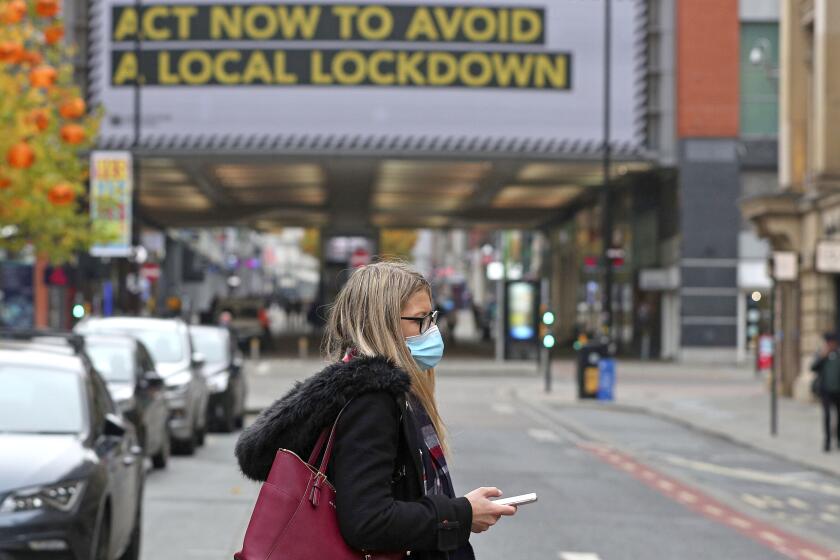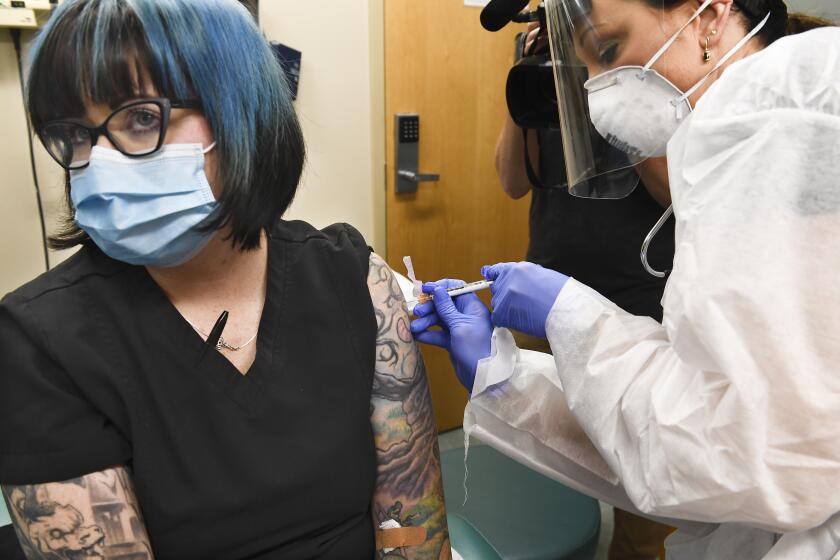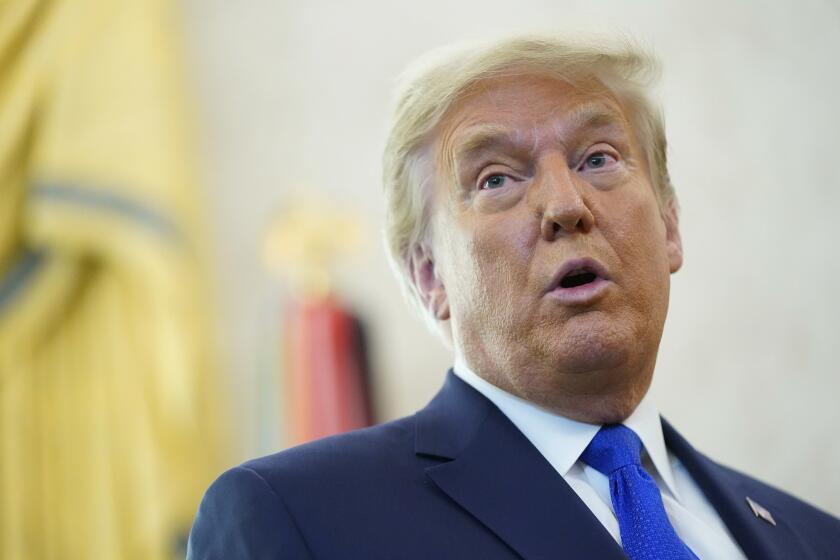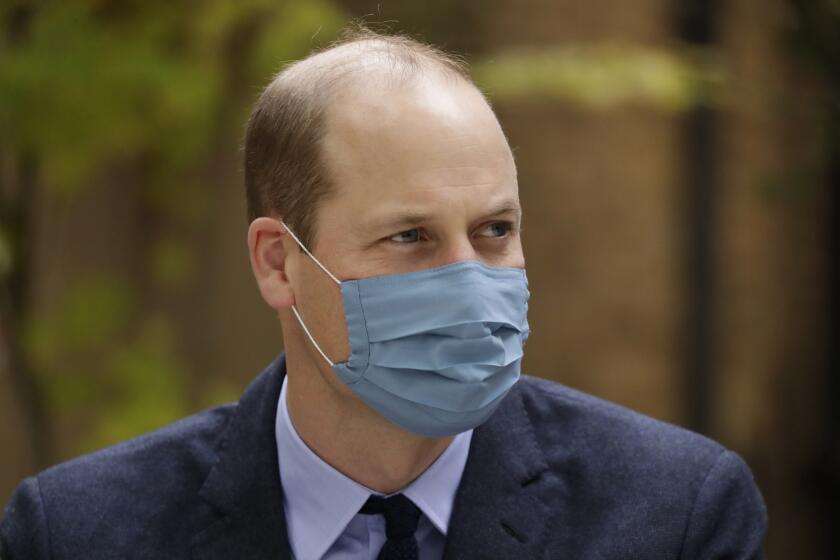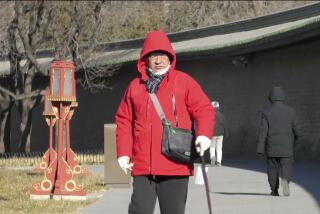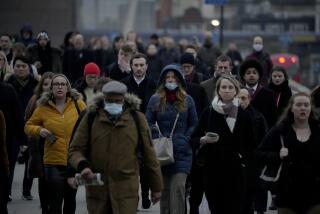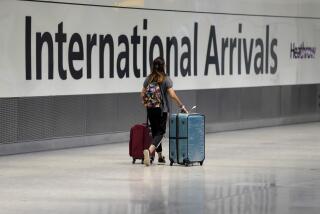‘A turning point’: Britain begins COVID-19 vaccinations
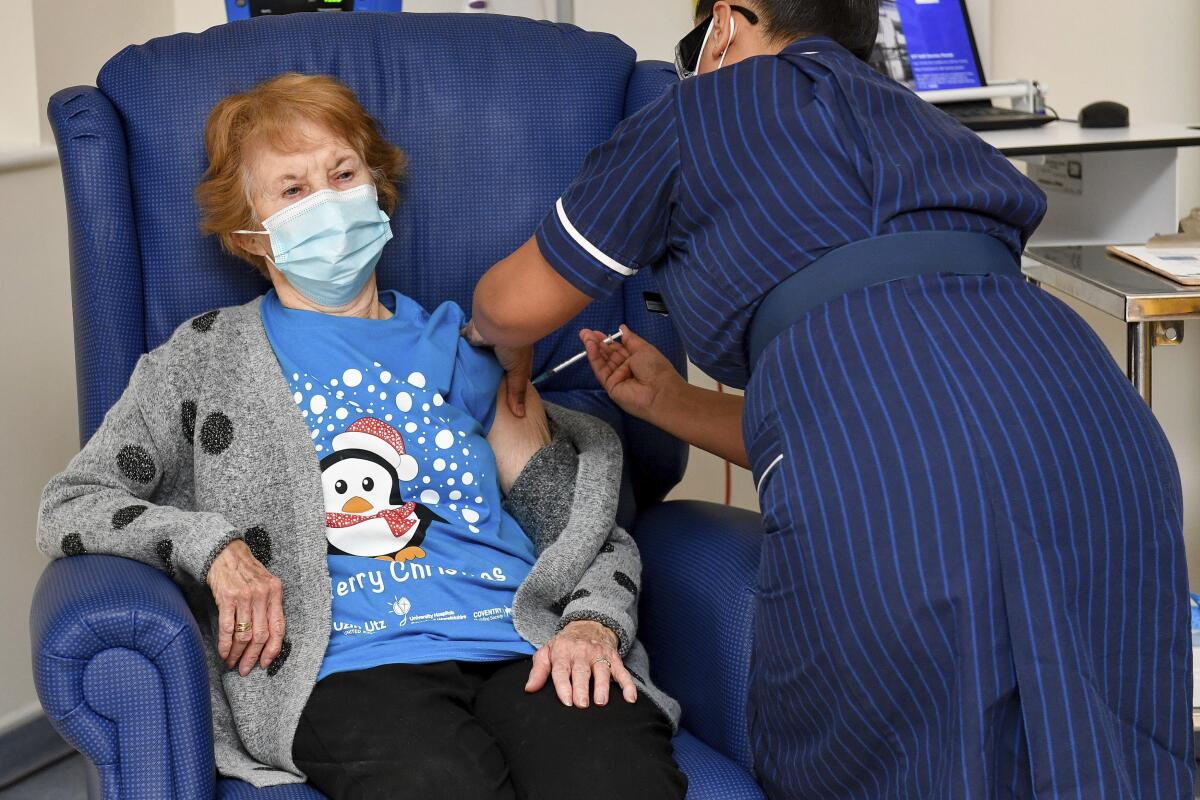
- Share via
LONDON — Britain on Tuesday became the first Western country to start inoculating its residents against the coronavirus, embarking on a mass vaccination campaign that other countries will watch closely and that could herald the eventual end of a pandemic responsible for claiming more than 1.5 million lives worldwide.
There were tears of joy and relief as staff members at roughly 50 National Health Service hospitals started administering the vaccine to their most elderly and vulnerable patients.
“I can’t tell you just how much emotion there was in that vaccination center,” said Stephen Powis, the medical director for NHS England. “This is truly a historical day, a turning point in this pandemic.”
First in line was grandmother Margaret Keenan, 90, who sat calmly in a chair in University Hospital Coventry, in central England, to receive the first of two injections of the vaccination developed by Pfizer and its German partner, BioNTech. Then, in an only-in-Britain moment, she was followed in the chair by an 81-year-old man named William Shakespeare from Warwickshire, where the playwright was born.
Keenan, who turns 91 next week, called the vaccination “the best early birthday present I could wish for.”
“It means I can finally look forward to spending time with my family and friends in the new year after being on my own for most of the year,” Keenan said, adding: “My advice to anyone offered the vaccine is to take it. If I can have it at 90, then you can have it, too!”
Her comment highlighted the gargantuan task facing the government of British Prime Minister Boris Johnson, as well as the leaders of countries around the globe: how to vaccinate an entire population swiftly, including those who are skeptical of the shots.
Britain becomes the first country to approve a fully tested COVID-19 vaccine, but its show of national pride raises EU hackles.
The Conservative-led government has been roundly criticized for its handling of the pandemic. Britain has the highest COVID-19 death toll of any nation in Europe, its expensive contact-tracing system has been riddled with problems, and its guidance on what residents can and cannot do under its tiered alert system has left many residents confused.
Last week, it became the first country to approve widespread use of the Pfizer vaccine after large-scale clinical trials. But despite proclamations by Health Secretary Matt Hancock that Tuesday was “V-Day” in the fight against the coronavirus — an echo of V-E (Victory in Europe) Day, which marked the end of the European phase of World War II — the battle is far from over.
The immediate challenge is logistical.
The vaccine must be stored at minus-94 degrees and has to be transported carefully and quickly from Belgium, where it is manufactured — a task that could become instantly more complex if post-Brexit trade negotiations, now on a knife edge, collapse in the next few days and increased border checks between Britain and the European mainland cause lengthy lines at the ports starting Jan. 1.
Each person also needs two shots, administered 21 days apart, so the initial batch of 800,000 Pfizer doses will cover only half that number of people.
There are still many unknowns when it comes to the pandemic, but the early signs of success for two experimental COVID-19 vaccines make a few things clear.
Nursing home residents were particularly hard hit during Britain’s first wave of infections in April and are at the top of the list to receive the vaccine, but officials have acknowledged that that won’t happen until the end of next week.
The vaccines come in a box of 975 doses, which cannot yet be thawed and divvied up safely in order to be taken to individual care facilities.
“We’re not there yet,” Hancock acknowledged Monday, adding: “But we can now see the light at the end of the tunnel.”
The longer-term problem may be persuading enough of the U.K.’s 67 million people to get vaccinated for effective immunity levels to be reached nationally.
Public trust in Johnson’s government is at an all-time low. More than 62,000 Britons have died of COVID-19, and the cumulative number of infections has surpassed 1.75 million. A majority of the population think the country’s handling of the pandemic has been a national humiliation, according to recent research by King’s College London and Ipsos MORI.
The Trump administration opted last summer to pass up the chance to buy millions of additional doses of one of the leading coronavirus vaccine contenders.
When top U.S. infectious-disease expert Dr. Anthony Fauci said Britain did not review the vaccine “as carefully” as American health regulators — comments he later backtracked on — his reservations did not go unnoticed.
Many feel that their longing to return to pre-coronavirus life isn’t enough to overcome their reservations that this shot — or “jab,” as the Brits call it — will fix everything.
“I want to wait and see what’s going on” before getting inoculated, store clerk Carmen Adilla said, adding that she speaks to customers daily who are confused and paranoid about the spread of the coronavirus and the talk of a vaccine. “People say they don’t want it. It’s a difficult and stressful time, and everyone is confused.”
As a Londoner who works in the caregiving sector and has lost several friends to COVID-19, Gifty Aryee knows full well that the coronavirus is not to be taken lightly. The 59-year-old always wears a medical-grade mask outdoors and has a small bottle of hand sanitizer attached to the strap of her handbag.
But she’s giving the vaccine only a cautious welcome instead of jumping for joy.
“If it’s something that will save lives, great. But I don’t want to be the first in line,” she said. “I plan to give it time to see how it works. I’m a bit nervous about it.”
Prince William, second in line to the British throne, had the coronavirus in April around the same time as his father, Prince Charles, the BBC says.
Britain has 40 million doses of the Pfizer vaccine on order, and other labs, including a partnership between Oxford University and drugmaker AstraZeneca, are working furiously to get their own vaccines approved quickly. But experts predict that it will still take considerable time — perhaps until the summer — for life to feel anything close to normal.
Peter Openshaw, professor of experimental medicine at Imperial College London and former president of the British Society for Immunology, said he understood the reluctance of some Britons to put their faith blindly in science. But he feels confident that most people will come on board once there is more widely available information about the vaccine and its safety.
The bigger threat is people thinking prematurely that the pandemic is over because a vaccine has arrived, especially with Christmas just days away.
Johnson and his Cabinet have been insistent on giving the country as close to a normal festive season as possible, to lift both the public mood and Britain’s faltering economy, which is facing its worst recession in 300 years. The government has decreed that up to three households will be allowed to mix indoors, exclusively, for five days, from Dec. 23 to 27.
But the move has been branded a disaster-in-waiting by many epidemiologists and public health experts, who fear it will lead to a surge in infections in January.
“We mustn’t throw away all the good work that people have done over the past many months in terms of trying to keep the infections down,” Openshaw said. “It would be a terrible mistake if we all threw away our masks and thought: ‘I’ve had enough of it.’ I completely understand people wanting to do that, but now is not the time.”
Powis, NHS England’s medical director, has warned that the immunization program will be a “marathon, not a sprint.”
Still, Hancock hailed the vaccine as “the beginning of the end of this pandemic.” He said he felt rather emotional himself when he watched Keenan receive the first shot Tuesday.
“It looks such a small thing, with the needle in her upper arm,” he said. “It was very straightforward and over in seconds, but it’s such an important moment in beating this disease.”
Boyle is a special correspondent.
More to Read
Sign up for Essential California
The most important California stories and recommendations in your inbox every morning.
You may occasionally receive promotional content from the Los Angeles Times.
